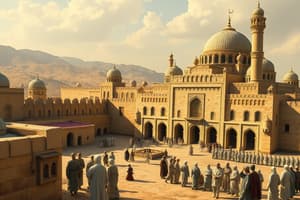Podcast
Questions and Answers
What period is referred to as the Golden Age of Islam?
What period is referred to as the Golden Age of Islam?
- 10th and 11th century
- 1st and 2nd century
- 7th to 13th century (correct)
- 7th and 8th century
Who is regarded as the Father of Optics?
Who is regarded as the Father of Optics?
- Ibn Sina
- Al-Khwarizmi
- Ibn al-Haytham (correct)
- Jabir ibn Hayyān
Which mathematician's name gave rise to the term 'algorithm'?
Which mathematician's name gave rise to the term 'algorithm'?
- Jabir ibn Hayyān
- Ibn al-Haytham
- Ibn Sina
- Muhammad ibn Musa al-Khwarizmi (correct)
What significant contribution did Ibn Sina make in medicine?
What significant contribution did Ibn Sina make in medicine?
Which work of Ibn Sina was used as a standard medicinal text in the 17th century?
Which work of Ibn Sina was used as a standard medicinal text in the 17th century?
What contribution did Jabir ibn Hayyān make to chemistry?
What contribution did Jabir ibn Hayyān make to chemistry?
Which numeral system was refined by Muslim mathematicians?
Which numeral system was refined by Muslim mathematicians?
What was a notable scientific approach used by Muslim scientists?
What was a notable scientific approach used by Muslim scientists?
Flashcards are hidden until you start studying
Study Notes
The Middle East and the Golden Age of Islam
- Predominantly Muslim population in Middle Eastern countries.
- The 7th to 8th centuries marked the spread of Islam, leading to a peak in intellectual achievements known as the Golden Age of Islam, lasting until the 13th century.
- Arabic served as the common language, facilitating access to Greek texts and ideas from India, fostering innovation and knowledge among Muslim scholars.
- Muslim scientists emphasized experimental science over theoretical thought, contributing to the development of the scientific method.
Contributions to Science
- Ibn al-Haytham recognized as the Father of Optics for his empirical work validating the intromission theory of light.
Mathematics
- Muhammad ibn Musa al-Khwarizmi's name is the origin of the term "algorithm," while "algebra" derives from al-jabr from one of his works.
- Arabic Numeral System, based on earlier Indian numeral systems, was refined by Muslim mathematicians, notably incorporating decimal point notation.
Chemistry
- Muslim chemists and alchemists were foundational in establishing modern chemistry, with Jabir ibn Hayyān known as the "Father of Chemistry."
Medicine
- Ibn Sina, a pivotal figure in medicine, introduced the concept of experimental medicine and was the first to conduct clinical trials.
- His influential works, the Book of Healing and The Canon of Medicine, served as standard medical references in both the Muslim world and Europe through the 17th century.
- Significant contributions include identifying the contagious nature of infectious diseases and advancing clinical pharmacology.
Studying That Suits You
Use AI to generate personalized quizzes and flashcards to suit your learning preferences.




